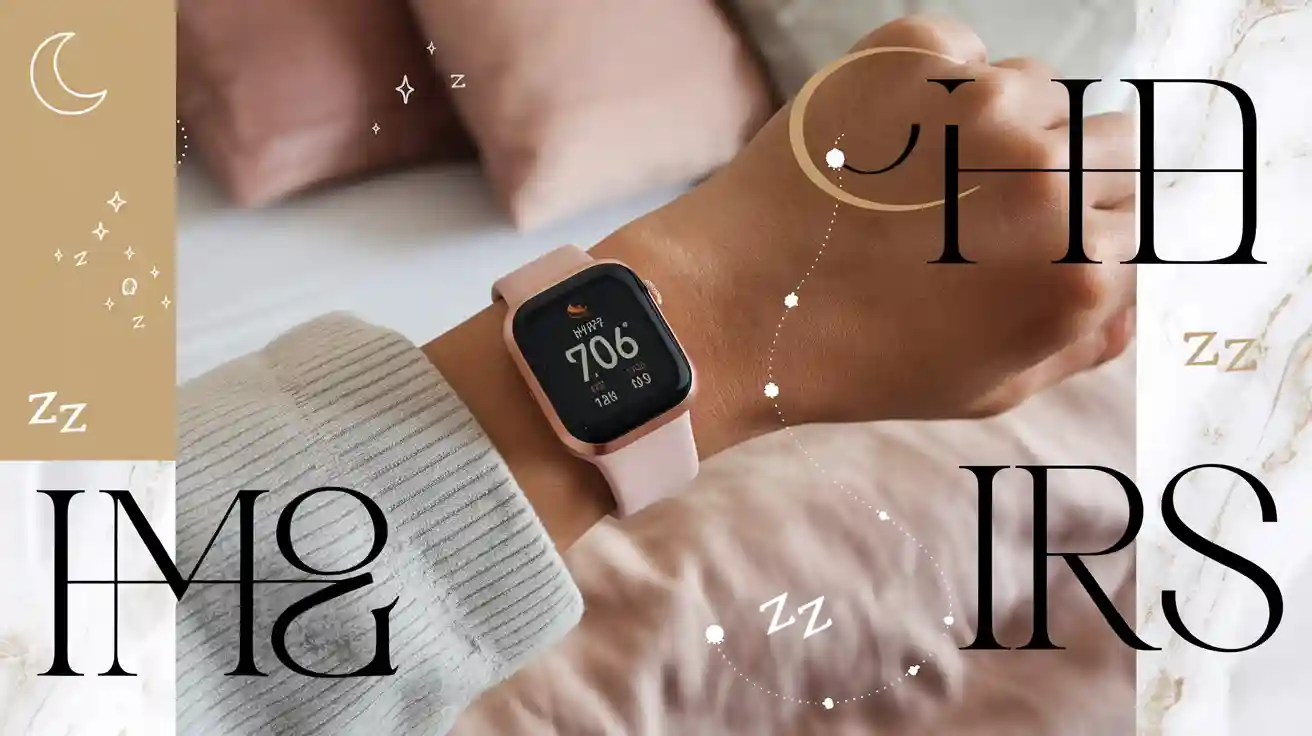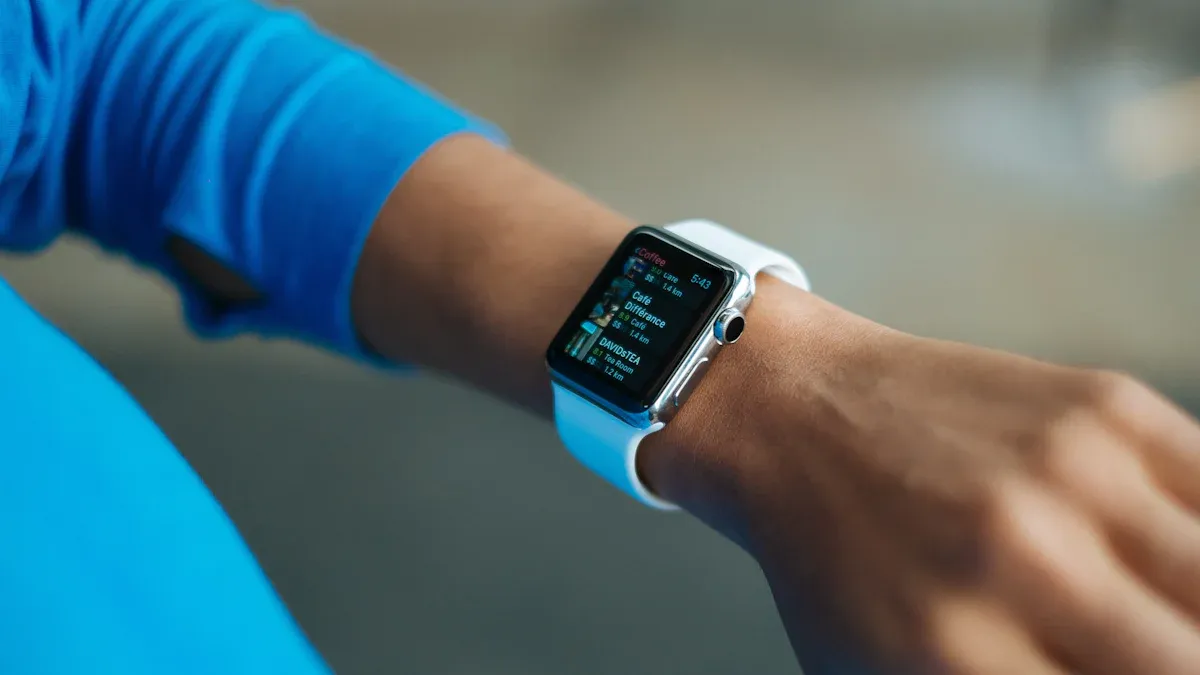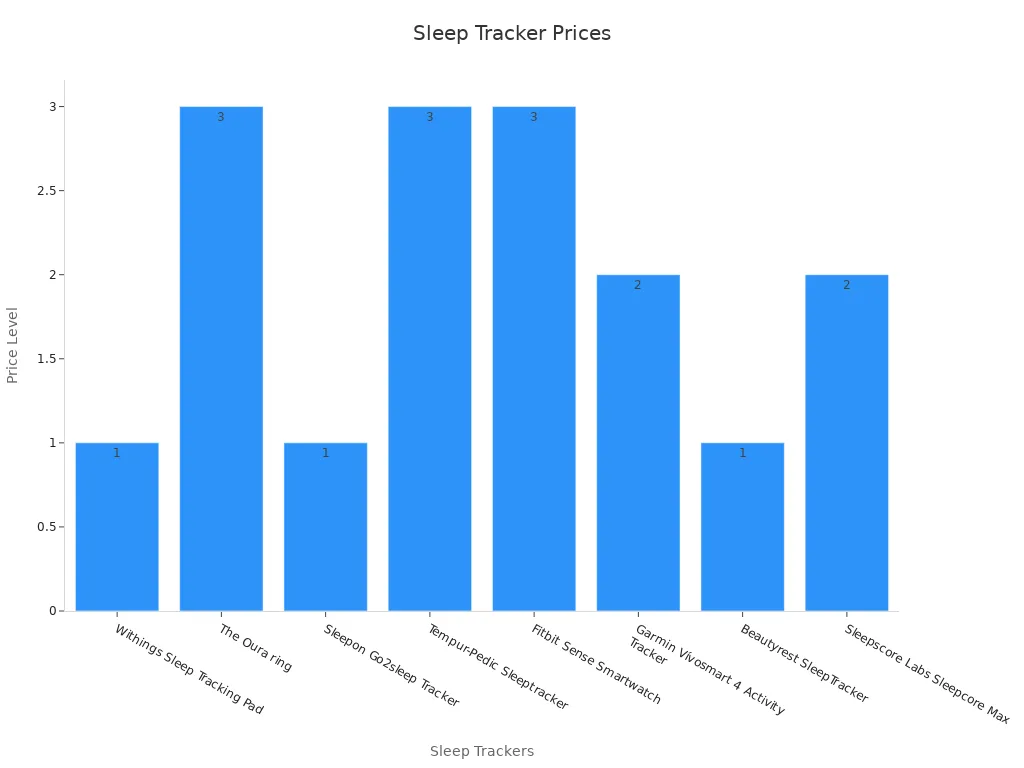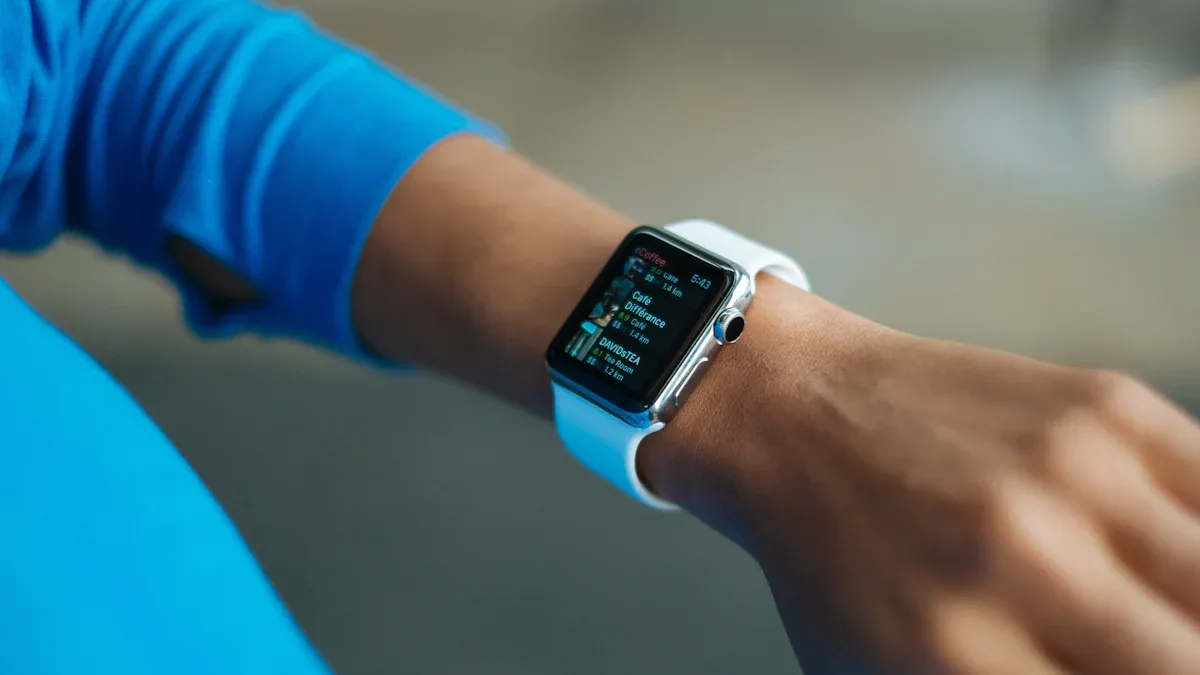
If you’re looking for the best wearable sleep tracker, 2025 has amazing choices. Here are the top five picks:
-
Whoop 4.0: Great for health tracking with sleep monitoring and workouts. It also tracks blood oxygen and muscle strain, loved by fitness fans.
-
Oura Ring Gen4: This light, waterproof ring focuses on sleep and readiness. It gives personal tips and accurate health info.
-
Samsung Galaxy Ring: Ideal for Android users, it mixes style with advanced sleep and health tracking.
-
Fitbit Inspire 3: Simple and affordable, it’s perfect for anyone wanting an easy tracker.
-
Garmin Forerunner 165: Best for athletes, it includes Training Readiness and Body Battery scores.
Whether you want detailed sleep data or a cheaper option, these devices showcase how the best wearable sleep tracker can enhance your health and wellness.
Key Takeaways
-
Pick a sleep tracker that fits your needs. Choices include cheaper ones like Fitbit Inspire 3 or advanced ones like Oura Ring Gen4.
-
Find trackers that give clear sleep details. Devices like Whoop 4.0 help you learn about your sleep and rest better.
-
Think about comfort and style when choosing. Light and adjustable options, like the Oura Ring, let you wear them easily all night.
-
Look at app features and ease of use. A good app makes tracking simple and gives helpful tips.
-
Watch out for extra costs. Some trackers need subscriptions for full features, so include this in your budget.
Features of the Best Wearable Sleep Trackers
Sleep Tracking Metrics and Insights
The best sleep trackers do more than show numbers. They study your sleep patterns and give detailed insights. These devices track how long you sleep, your sleep stages (light, deep, and REM), and your movements at night. This helps you see how well you sleep and what affects it.
For instance, the Oura Ring Gen4 gives personal sleep tips by checking your sleep stages and readiness score. The Fitbit Inspire 3 is simple but effective, focusing on how long and restful your sleep is. These trackers help you spot patterns over time, so you can improve your sleep.
Additional Health Monitoring Features
Top sleep trackers also monitor your health beyond sleep. They measure things like heart rate variability, breathing rate, and blood oxygen levels. These details show how your body recovers while you sleep.
Here’s how these features help with sleep:
|
Health Metric |
How It Helps Sleep Quality |
|---|---|
|
Heart Rate Variability |
High variability during REM sleep shows better sleep quality. |
|
Long-term Monitoring |
Links sleep quality to health issues like depression and breathing problems. |
|
Gamification and Feedback |
Motivates better sleep habits with fun and helpful tools. |
Devices like the Whoop 4.0 and Samsung Galaxy Ring shine here. They mix sleep tracking with heart rate checks and fun feedback to keep you engaged.
App Integration and User Experience
A good sleep tracker isn’t just about the device—it’s also about the app. These apps are easy to use and full of features. They show your sleep data, help you set goals, and give tips for better rest.
More people now care about app features. About one-third of users track their sleep with wearables, showing how important this is. Modern apps track sleep stages, heart rate, and movement. From 2016 to 2023, users reporting better sleep from wearables grew from 22% to 42%. This proves apps are improving to meet user needs.
Whether you pick the Garmin Forerunner 165 for fitness or the Samsung Galaxy Ring for Android, these apps make sleep tracking simple and fun.
Accuracy in Sleep Tracking
Sleep Stage Detection Capabilities
Knowing your sleep stages is very important. These stages—light, deep, and REM—help your body rest and recover. The best trackers study these stages to give useful sleep details. For example, the Fitbit Inspire 2 showed 93.9% accuracy in tracking total sleep stages. It was 59.1% accurate for light sleep, 83.7% for deep sleep, and 82.3% for REM sleep. This proves how reliable modern trackers are for sleep monitoring.
Here’s a comparison of popular devices for sleep stage tracking:
|
Device |
Accuracy (%) |
Light Sleep (%) |
Deep Sleep (%) |
REM Sleep (%) |
|---|---|---|---|---|
|
Oura Ring |
53.18 |
58.00 |
N/A |
N/A |
|
SleepOn Ring |
50.48 |
58.00 |
N/A |
14.00 |
|
Circul Ring |
35.06 |
N/A |
N/A |
14.00 |
These numbers show the strengths and weaknesses of each tracker. While not perfect, they still give helpful insights into your sleep quality.
Heart Rate and Respiratory Monitoring
Tracking heart rate and breathing helps you see how your body recovers during sleep. Devices like the Garmin Fenix 5x and Apple Watch are very accurate. For example, the Garmin Fenix 5x had less than -1 bpm bias, showing great heart rate accuracy. The Apple Watch 6 had a Pearson correlation coefficient (PCC) of r=0.98, proving it’s reliable when compared to medical tools.
Here’s a quick look at heart rate accuracy for some devices:
|
Device |
Study Context |
Heart Rate Accuracy (bpm) |
Notes |
|---|---|---|---|
|
Apple Watch |
Post-surgery patients |
MAPE between 1% and 7% |
Accurate for people with heart conditions. |
|
Garmin Fenix 5x |
Healthy participants |
Bias < -1 bpm |
Reliable for heart rate tracking. |
|
Fitbit |
ICU patients |
Bias of -4.7 bpm |
Correlation of r=0.74 with medical standards. |
These results show that wearables do more than track sleep—they also provide health data to guide your choices.
Data Consistency Across Devices
Consistency matters when tracking sleep over time. Wearables are good at measuring sleep length, but their accuracy for sleep stages can differ. Algorithms using processed data can reach up to 92.6% accuracy. However, sleep/wake detection specificities range from 41% to 60.2%. This means devices are great for trends but may not always be exact.
Key points about data consistency:
-
Wearables help you understand sleep patterns better.
-
Regular sleep habits are as important as sleep length.
-
High-BMI users may see more variation in sleep data.
Even with these challenges, wearable trackers are still great tools for improving sleep and health.
Comfort and Design of Sleep Trackers

Wearability and Comfort During Sleep
Comfort is very important for sleep trackers. A bulky device can disturb your rest. That’s why top trackers are made to feel light and easy to wear. For example, the Oura Ring 4 is so light you might forget it’s on. It tracks your sleep and health quietly without bothering you.
Some trackers, like the Sleep A20, are great for side sleepers. They use soft materials that don’t press on your ear. These devices also come with different sizes of ear tips and wings. This helps them fit snugly for all types of sleepers. Whether you sleep on your back, side, or stomach, these trackers adjust to your needs.
Material Quality and Durability
Trackers need to be strong and comfortable. They should handle daily use and still feel good on your skin. Many top trackers use soft, durable materials. For instance, some designs spread pressure evenly to avoid discomfort. This is helpful if you wear your tracker every night.
Here’s a quick look at features for comfort and durability:
|
Feature |
الوصف |
|---|---|
|
Adaptive Design |
Shapes to your ear for better comfort. |
|
Pressure Distribution |
Spreads pressure evenly to prevent discomfort. |
|
Customizable Fit Options |
Comes in different sizes for a perfect fit. |
|
Material Quality |
Soft and strong, great for side sleepers. |
These designs make it easy to track your sleep every night.
Battery Life and Charging Efficiency
Nobody likes charging their tracker every day. That’s why battery life is important. Many trackers, like the Sleep A20, last up to 10 nights per charge. This lets you focus on your sleep without worrying about charging often.
Fast charging is also useful. Some trackers charge quickly, so you’re ready for the next night. Whether it’s a ring, watch, or band, these trackers fit into your busy life.
Price and Value of the Best Sleep Trackers
Comparing Prices of Popular Trackers
Sleep tracker prices differ based on type and features. Here's a simple price guide for various sleep monitors:
|
Type of Sleep Monitor |
|
|---|---|
|
Wrist Sleep Tracker |
$30 to $399 |
|
Smartwatches |
$100 to $800+ |
|
Under-Mattress Trackers |
$130 |
|
Smart Rings |
$299 to $609 |
|
Headbands |
$399.99 to $444.98 |
|
Prescription Devices |
$150 to $1,000 |
Wearable trackers, like rings and wristbands, are part of a growing $30 billion sleep industry. These devices track your sleep and give tips to improve it. The Oura Ring is a favorite because it looks nice and is easy to use.
Balancing Features and Costs
Are expensive trackers worth it? It depends on your needs. Cheaper options, like the Fitbit Inspire 3, are great for basic sleep tracking. High-end devices, like the Oura Ring Gen4 or Garmin Forerunner 165, offer advanced features. These include heart rate checks, detailed sleep data, and fitness tracking.
Here's a quick look at some trackers and their best features:
|
Sleep Tracker |
Price Category |
الميزات |
|---|---|---|
|
Withings Sleep Tracking Pad |
$ |
Best under-the-mattress tracking pad |
|
Oura Ring |
$$ |
|
|
Sleepon Go2sleep Tracker |
$ |
Best for tracking other health concerns |
|
Tempur-Pedic Sleeptracker |
$$ |
Best for couples |
|
Fitbit Sense Smartwatch |
$$ |
Best smartwatch |
|
Garmin Vívosmart 4 Activity Tracker |
$ |
Best fitness tracker |
Your choice depends on what matters most to you. If you want detailed sleep info, spending more might be worth it.
Extra Costs and Subscriptions
Some trackers have extra costs, like subscriptions for special features. For example, the Whoop 4.0 needs a monthly membership for full data access. This adds to the cost but gives detailed insights and tips. Others, like the Fitbit Inspire 3, offer free basic tracking but charge for advanced features through Fitbit Premium.
Check for hidden costs before buying. A cheaper device might cost more later if subscriptions are needed. Compare features and total costs to find the best deal.

Best Wearable Sleep Tracker for Different Users

Best for Budget-Conscious Buyers (e.g., Fitbit Inspire 3)
If you want a low-cost but dependable tracker, try the Fitbit Inspire 3. It costs about $100 or less and includes key features like step tracking, heart rate monitoring, and basic sleep data. You don’t need to pay for a subscription to use these features, making it even more affordable. You can also join fun challenges with friends to stay motivated without extra costs.
This tracker is great for anyone wanting better sleep and health on a budget. It’s easy to use and gives accurate results for its price. If you’re new to trackers or just want something simple, the Fitbit Inspire 3 is a smart choice.
Best for Advanced Sleep Analytics (e.g., Oura Ring Gen4)
For detailed sleep tracking, the Oura Ring Gen4 is a top pick. It tracks sleep stages, blood oxygen levels, and breathing issues. Compared to older versions, the Gen4 improves SpO2 signal quality by 120% and overnight accuracy by 30%. It also reduces gaps in heart rate tracking by 31% at night and 7% during the day.
This stylish ring doesn’t just track—it helps you learn about your sleep. With better accuracy and custom insights, the Oura Ring Gen4 is perfect for anyone serious about improving rest and recovery.
Best for Fitness Enthusiasts (e.g., Garmin Forerunner 165)
For fitness lovers, the Garmin Forerunner 165 is ideal. It combines workout tracking with excellent sleep monitoring. It includes GNSS for accurate workout data, an altimeter for elevation tracking, and wrist-based running power analysis. These features help you track performance and recovery.
The bright AMOLED screen makes data easy to see, and Training Effect insights show how your runs improve fitness. Whether you’re training for a race or staying active, the Garmin Forerunner 165 supports your goals while tracking your sleep.
Best for Android Users (e.g., Samsung Galaxy Ring)
If you use Android, the Samsung Galaxy Ring is a great choice. This stylish ring works perfectly with other Samsung devices. It tracks sleep and heart rate without needing a subscription. This means no extra costs for long-term use.
The Galaxy Ring works even better with Samsung gadgets. Pairing it with a Samsung phone or watch improves battery life and app performance. It’s a smart and affordable option for Android users who want reliable health tracking.
While it doesn’t have as many features as the Oura Ring Gen4, it covers the basics well. You can track sleep stages, heart rate, and stress levels in one small device. Its strong design also makes it durable for daily use.
If you already own Samsung products, the Galaxy Ring is a simple choice. It’s stylish, practical, and helps you stay healthy and rested.
Best Overall Sleep Tracker (e.g., Whoop 4.0)
The Whoop 4.0 is the best for overall performance. It does more than basic sleep tracking. It shows details like time in bed, deep sleep, and sleep debt. You can also see trends over weeks or months to track progress.
One unique feature is its journal tool. You can log daily habits, like coffee or workouts, that affect your sleep. This helps you make better choices for better rest.
Here’s why people love the Whoop 4.0:
-
It gives detailed sleep insights.
-
You can track recovery and habits over time.
-
The journal connects your actions to sleep quality.
Whether you’re an athlete or just want better sleep, the Whoop 4.0 is for you. It’s more than a tracker—it’s a tool to improve your life.
Picking the right sleep tracker depends on your needs. Each tracker has good and bad points, as shown here:
|
Strengths |
Weaknesses |
|---|---|
|
Easy to Use |
May Overestimate Sleep Time |
|
Tracks Long-Term Data |
Not Always Accurate for Sleep Stages |
|
Affordable Options |
N/A |
|
Helps You Learn About Sleep |
N/A |
|
Links Sleep to Overall Health |
N/A |
|
Can Spot Problems Early |
N/A |
Dr. Jing Zhang explains that sleep trackers often think you're sleeping when you're awake. This can be hard for people with sleep problems.
If you want something cheap, try the Fitbit Inspire 3. For detailed data, the Oura Ring Gen4 is the best. Fitness fans should pick the Garmin Forerunner 165. Android users will like the Samsung Galaxy Ring. For the best all-around tracker, go with the Whoop 4.0.
In the end, choose what fits your needs—whether it’s saving money, getting detailed info, or tracking workouts. Sleep trackers are great tools to help you sleep better and stay healthy.
التعليمات
What is the most accurate sleep tracker?
إن Whoop 4.0 and Oura Ring Gen4 are very accurate. They track sleep stages, heart rate, and recovery well. If you want detailed sleep data, these are great picks.
Do sleep trackers work for everyone?
Yes, but results differ. Sleep trackers help most people understand their sleep. If you have health issues, ask a doctor for advice. Remember, trackers are tools, not medical devices.
How long do sleep tracker batteries last?
Battery life varies by device. The Oura Ring Gen4 lasts 7 days, while the Fitbit Inspire 3 lasts 10 days. Check the product details for exact battery info.
Are sleep trackers worth the cost?
Yes! Sleep trackers show your sleep habits and improve health. Affordable ones like the Fitbit Inspire 3 are great. High-end ones like the Whoop 4.0 offer advanced features for serious users.
Can I wear a sleep tracker all day?
Yes, most trackers are made for all-day use. Devices like the Samsung Galaxy Ring and Garmin Forerunner 165 track sleep, activity, and health nonstop. Just charge them when needed!




